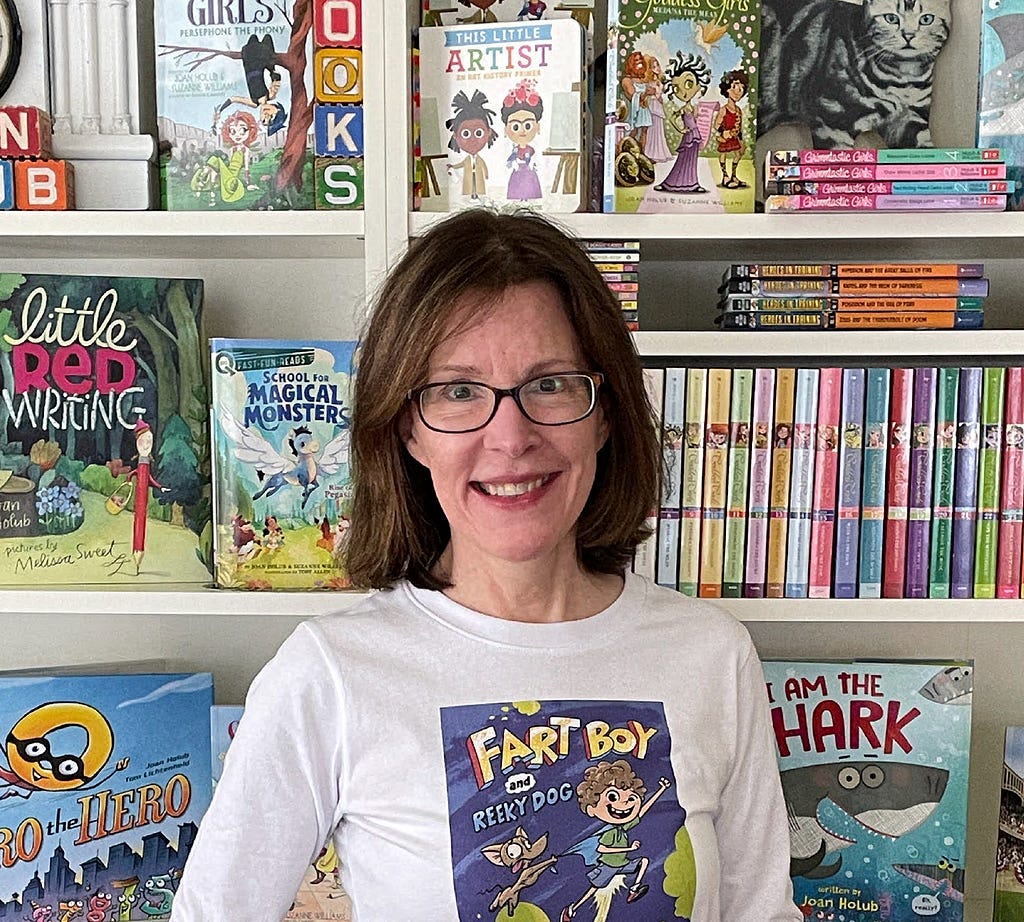Raising Resilient Kids: Author Joan Holub On Strategies for Nurturing Emotional Strength in Children
Take care of yourself as a parent. Finding a balance between nurturing children and allowing them to learn from challenges they meet isn’t easy, but it is important. One way to foster resilience is by empowering kids with their own problem-solving skills. Instead of jumping in to fix everything for them, we can guide them toward finding their own solutions to everyday problems. The result is a happier, more resilient child. And a parent who isn’t exhausted.
In today’s fast-paced world, children face numerous challenges that can impact their emotional well-being. Developing resilience is key to helping them navigate these obstacles and grow into emotionally strong individuals. How can parents, educators, and caregivers foster this resilience in children? As part of this interview series, we had the pleasure to interview children’s book author, Joan Holub.
Joan Holub is the New York Times bestselling author of 200+ books for children, including picture books (Zero the Hero), chapter book series (Heroes in Training), biographies (Who Was Babe Ruth?), and the middle grade series of 31 Goddess Girls books. Fart Boy and Reeky Dog, her new (and first) graphic novel, has earned a starred review from Publisher’s Weekly plus additional accolades. https://www.joanholub.com/
Thank you so much for doing this with us! Before we dig in, our readers would like to ‘get to know you’. Can you tell us a bit about your background and your backstory?
I’m from a family of five, with a loving mom and distant dad. As the middle child, I had it easy. I made good grades and was on the high school dance team. My mom liked to read and took us kids to the local library. She read books to us at home, a chapter a night before bedtime. I likely would not be a children’s book author if not for her influence.
Can you share a story with us about what brought you to your particular career path?
Graphic design was my first job out of college. What I really wanted to be was a children’s book author, however that seemed an unrealistic goal. Still, at night and on weekends, I wrote children’s book manuscripts, hoping to get published. My early efforts weren’t stellar, but as a child, I had been encouraged to always try, try again. Eventually, my hard work paid off, and my dream of becoming a children’s book author came true!
Can you share with our readers a bit about why you are an authority on raising resilient kids? In your opinion, what is your unique contribution to this field?
One of my goals in writing workshops is to coax kids to be brave in their writing. To be unafraid to try writing something surprising, weird, silly, or “different”. To discover an out of the box idea that appeals to them. For instance, most kids are amused and/or surprised to learn that I (a woman) wrote a funny graphic novel with the word “fart” in the title. My message to hopeful writers? You’ll often stand out in a good way if you don’t follow the crowd.
Do you have a favorite “Life Lesson Quote”? Do you have a story about how that was relevant in your life or your work?
(Quote) “The scariest moment is always just before you start.” — Stephen King
I so agree with you, Stephen King! Especially when it comes to writing a book. As in many life situations, there are gatekeepers and hurdles along the way to achieving goals. My scariest moments in children’s books are the ones when I submit a new manuscript to an editor for the first time. I’ve worked diligently on it and have last-minute fears that I’m wrong about its worth. That it’s not “good enough”. Can you imagine handing an editor a manuscript titled Fart Boy and Reeky Dog? I can. And I did. And it has been published by Penguin/RandomHouse. So be brave, writers, young and not-so-young!
Ok, thank you for all that. Now let’s move to the main focus of our interview. How can parents handle situations when a child faces failure or disappointment? What strategies can parents use to help a child bounce back?
When I work with kids in graphic novel and story writing workshops, we celebrate progress, not just success. Kids often come into a workshop feeling frustrated. They have an idea, character, and/or situation, but don’t know what to do with it. They think they’re failures because they’re temporarily stumped. I acknowledge and validate each child’s emotions, making them feel heard and understood. Then we discuss. “What’s another way we could come at the bones of your story?” By allowing kids to find their own solutions, we help them discover ways to overcome self-perceived failure. In life and in writing, those failures are simply the stepping stones to success.
What role does parental modeling of resilience play in the development of emotional strength in children? Can you share an example of a resilient parenting moment that you experienced directly or that you have come across in the course of your work?
In peer group discussions about writing, I structure my classes so that each child gets two “congratulations” and one “suggestion to improve”. I got this idea from a parent who has each of her children give themselves “two congrats” and “one suggestion for improvement” at the end of each week. It works in my classes.
What approaches do you recommend to foster a growth mindset in children, encouraging them to see challenge as opportunities to learn?
I recently spoke with a young boy author who’d been discouraged (by a teacher!) regarding a story the boy had written. As kids or adults, we’re always putting ourselves and our work out there on the line. We may have fears of failure or of being judged. My advice: Praise the effort a child puts in, not the outcome.
How can parents balance providing support with allowing their children to experience and overcome difficulties on their own?
We all know how awful it is to struggle or feel embarrassed or sad. Validate your child’s feelings. Before stepping in to fix a situation, encourage kids to brainstorm ideas for solutions to their problem. Leave room for them to learn from their mistakes.
What self-care practices would you recommend for parents to maintain their own resilience while going through the everyday challenges of raising children?
Make time to do something you love at least once a week. Let it be known in the household that this is your “alone hour” or your “yoga class afternoon”. For instance, I’m a line dancer. It’s something I can do apart from my family, and then come back to them refreshed and in a good mood.

Can you please share “5 Strategies To Raise Children With Resilience and Emotional Strength”?
1. Praise the effort your child put in.
Example: When my child (or adult) graphic novel writers are stumped, they come to me seeking advice. So, first, we focus on figuring out their story’s heart — its main problem and a solution to that problem. Then we focus on the good in their story, and get rid of the stuff we don’t like or don’t need. We make an effort to find one or more story solutions. It’s a lot of work, and I praise their efforts, even if the solution they arrive at isn’t perfect — yet.
2. Perseverance.
Example: At speaking events, I tell kids I’ve written and published 200+ children’s books, and I mention some of my books they’d likely know. For a moment, they think it must be easy to write and sell books to a publisher! Then I display a slide of my many unpublished works — my “file cabinets of doom”. The kids are surprised — and heartened — to learn that even published authors will have failures along the path to success. This notion hints that they can succeed, too!
3. Take care of yourself as a parent.
Finding a balance between nurturing children and allowing them to learn from challenges they meet isn’t easy, but it is important. One way to foster resilience is by empowering kids with their own problem-solving skills. Instead of jumping in to fix everything for them, we can guide them toward finding their own solutions to everyday problems. The result is a happier, more resilient child. And a parent who isn’t exhausted.
4. Help kids learn from challenges.
Children learn by observing, so model how you handle challenges, setbacks, and stress. I tell kids that I have received more book rejections in my life from editors than I have acceptances. And that I’ve learned from those experiences, which have helped me improve my work.
5. Encourage movement.
Encourage writing, art, dance, music, etc. These are wonderful outlets for self-discovery and emotional expression.
Are there any specific tools or resources (books, apps, courses) you recommend for individuals looking to improve in this area?
Thrivers: The Surprising Reasons Why Some Kids Struggle and Others Shine by Michele Borba Ed.D.
Raising Mentally Strong Kids by Daniel G. Amen MD & Charles Fay PHD
Wonderful. We are nearly done. Is there a person in the world, or in the US, with whom you would like to have a private breakfast or lunch, and why? He or she might just see this, especially if we tag them. 🙂
Tom Lichtenheld, who illustrated a picture book I wrote, Zero the Hero. Most people aren’t aware that authors typically never meet the illustrators of their work. I love Tom’s illustrations in Zero the Hero and would be interested to chat with him!
How can our readers further follow your work online?
https://www.instagram.com/joan.holub/
https://www.facebook.com/joanholub
@joanholub.bsky.social
This was very meaningful, thank you so much. We wish you only continued success on your great work!
Raising Resilient Kids: Author Joan Holub On Strategies for Nurturing Emotional Strength in… was originally published in Authority Magazine on Medium, where people are continuing the conversation by highlighting and responding to this story.
